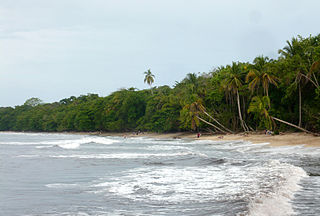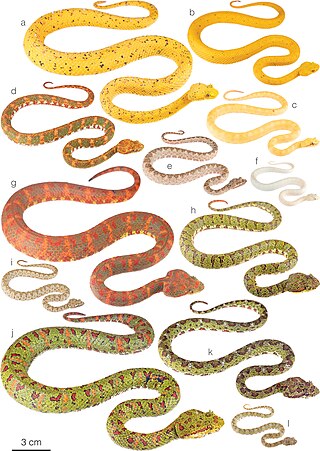
Bothriechis schlegelii, known commonly as the highlandeyelash-pitviper or Schlegel'seyelash-pitviper, is a species of pit viper in the family Viperidae, native to Latin America. Somewhat small, arboreal snakes, B. schlegelii is perhaps best known for the namesake superciliary ("eyelash") scales above its eyes, and for having distinctly keeled or "raised" scales covering the bulk of its body. The species is also known for producing a veritable rainbow of color forms (morphs). It is the most common of the green palm-pitvipers, and is often present in zoological exhibits, owing to its general hardiness. The specific name schlegelii honors Hermann Schlegel, who was a German ornithologist and herpetologist.

Bothriechis is a genus of pit vipers, commonly called palm vipers or palm-pitvipers found predominantly in Mexico and Central America, although the most common species, B. schlegelii, ranges as far south as Colombia and Peru. All members are relatively slender and arboreal. The name Bothriechis is derived from the Greek words bothros and echis that mean "pit" and "viper" respectively. Ten species and no subspecies are currently generally recognized.

Bothriechis lateralis is a pit viper species found in the mountains of Costa Rica and western Panama. No subspecies are currently recognized.

Cahuita National Park is a terrestrial and marine national park in the Caribbean La Amistad Conservation Area of Costa Rica located on the southern Caribbean coast in Limón Province, connected to the town of Cahuita. It protects beaches and lowlands and attracts tourists and other visitors who are able to snorkel in the protected marine area which contains the coralline reefs, as well as being a nesting ground for sea turtles. It covers a land area of 2,732 acres (1,106 ha), and a marine area of 55,200 acres (22,300 ha). February through April typically have the best underwater visibility. This is also one of the nicest and least developed beaches in Costa Rica.

Bothriechis nigroviridis is a pit viper species found in the mountains of Costa Rica and Panama. No subspecies are currently recognized. The specific name is derived from the Latin niger (black) and viridis (green) in reference to its distinctive color pattern.

Bothriechis bicolor is a pit viper species found in southern Mexico, Guatemala and Honduras. The specific name refers to the contrasting ventral and dorsal colors. No subspecies are currently recognized.

Bothriechis aurifer is a pit viper species found in Mexico and Guatemala. No subspecies are currently recognized.

Bothriechis marchi, also known as Honduran palm pit viper and March's palm pit viper, is a species of pit viper, a venomous snake, in the subfamily Crotalinae of the family Viperidae. The species is endemic to Central America. There are no subspecies that are recognized as being valid.

Bothriechis thalassinus, also known as Merendon palm-pitviper or Merendon palm pit viper, is a pit viper species native to Guatemala and Honduras.

Bothriechis supraciliaris, commonly known as the blotched eyelash-pitviper, is a species of venomous snake in the subfamily Crotalinae of the family Viperidae. The species is endemic to southern Pacific parts of Talamanca Mountain Range in Costa Rica and western Panama.

Bothriechis guifarroi is a species of green palm pit vipers discovered in 2010 in the Texiguat Wildlife Refuge, in Northern Honduras. Bothriechis guifarroi joins two other species of the genus Bothriechis, B. marchi and B. thalassinus, found in the Chortís Highlands of Honduras.

Bothriechis nubestris, the Talamancan palm-pitviper, is a species of pit viper native to cloud forests and montane rainforests in Costa Rica, specifically San José, Cartago and Limón. The snake was mistaken for Bothriechis nigroviridis.

The Central American eyelash-pitviper is a species of pit viper.

Bothriechis torvus is a species of pit viper. Although once listed as a synonym of Bothriechis schlegelii, it was revalidated in a 2024 revision of the latter species.

Bothriechis nitidus is a species of pit viper. Although once listed as a synonym of Bothriechis schlegelii, it was revalidated in a 2024 revision of the latter species. The species is endemic to Ecuador.

Bothriechis rahimi is a species of pit viper described in 2024.

Bothriechis rasikusumorum is a species of pit viper described in 2024.

Bothriechis khwargi is a species of pit viper described in 2024.

Bothriechis hussaini is a species of pit viper described in 2024.



















